

MLA Formatting and Style Guide. Summary: MLA (Modern Language Association) style is most commonly used to write papers and cite sources within the liberal arts and humanities.

This resource, updated to reflect the MLA Handbook for Writers of Research Papers (7th ed.) and the MLA Style Manual and Guide to Scholarly Publishing (3rd ed.), offers examples for the general format of MLA research papers, in-text citations, endnotes/footnotes, and the Works Cited page. Contributors:Tony Russell, Allen Brizee, Elizabeth Angeli, Russell Keck, Joshua M. Paiz, Purdue OWL StaffLast Edited: 2014-02-13 07:30:31 MLA lists electronic sources as Web Publications. It is always a good idea to maintain personal copies of electronic information, when possible. Important Note on the Use of URLs in MLA MLA no longer requires the use of URLs in MLA citations. For instructors or editors who still wish to require the use of URLs, MLA suggests that the URL appear in angle brackets after the date of access.
Aristotle. Citing an Entire Web Site. Sage Publications Ltd: Psychology of Music: 0305-7356, 1741-3087. Psychology of Music publishes peer-reviewed papers directed at increasing the scientific understanding of any psychological aspect of music.
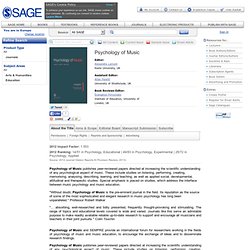
These include studies on listening, performing, creating, memorising, analysing, describing, learning, and teaching, as well as applied social, developmental, attitudinal and therapeutic studies. All Volumes and Issues - Browse - Music Perception: An Interdisciplinary Journal. Coverage: 1983-2014 (Vols. 1-31) Music Perception charts the ongoing scholarly discussion and study of musical phenomena.
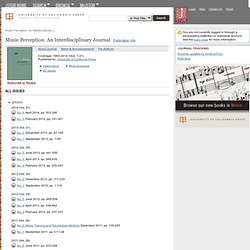
EBSCOhost: Ethnomusicology: The Study of Music and Culture. EBSCOhost: Music to Your Brain. Does music help us learn language? : Cognitive Daily. One of the first steps to learning a language is figuring out where one word ends and the next one begins.
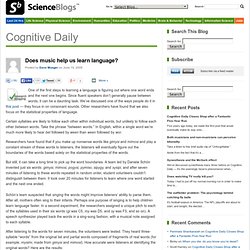
Since fluent speakers don’t generally pause between words, it can be a daunting task. We’ve discussed one of the ways people do it in this post — they focus in on consonant sounds. Other researchers have found that we also focus on the statistical properties of language. Certain syllables are likely to follow each other within individual words, but unlikely to follow each other between words. Take the phrase “between words.” Researchers have found that if you make up nonsense words like gimysi and mimosi and play a constant stream of these words to listeners, the listeners will eventually figure out the boundaries of the words based solely on the statistical properties of the words. But still, it can take a long time to pick up the word boundaries. After listening to the words for seven minutes, the volunteers were tested. Music and Learning. Music helps kids improve learning. Enhance Learning with Children's Books and Music.
Children's books and music are not just fun and games.
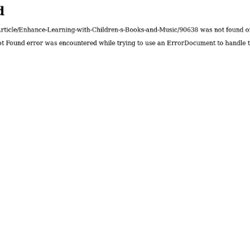
They play critical roles in children's growth, learning, and development. Children who learn to read early and well have a better chance of reaching their full potential in school and in life. Reading is the most fundamental learning skill; children who do not learn to read when they are young have difficulty learning, achieving, and succeeding throughout their lives. Read Out Loud. Using music to stimulate learning. Can music really stimulate learning?
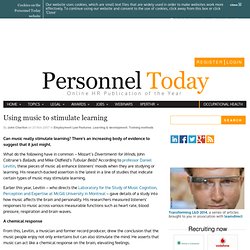
There’s an increasing body of evidence to suggest that it just might.
How Music Can Help Your Child Learn. Can popping a classical music CD into the player after nap time help Johnnie breeze through his homework?
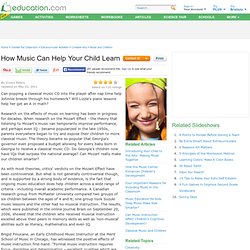
Will Lizzie's piano lessons help her get an A in math? Research on the effects of music on learning has been in progress for decades. When research on the Mozart Effect - the theory that listening to Mozart's music can temporarily improve performance, and perhaps even IQ - became popularized in the late 1950s, parents everywhere began to try and expose their children to more classical music.
The theory became so popular that Georgia's governor even proposed a budget allowing for every baby born in Georgia to receive a classical music CD. Do Georgia's children now have IQs that surpass the national average? As with most theories, critics' verdicts on the Mozart Effect have been controversial. Music Helps to Boost Learning. Posted on July 29, 2010, 6 a.m. in Brain and Mental PerformanceSensory Neuroplasticity is the brain's ability to adapt and change as a result of training and experience over the course of a person's life.

A recent newfound research focus on the effects of music training on the nervous system reinforce the concept of neuroplasticity, with data suggesting that the neural connections made during musical training also prime the brain for other aspects of human communication, such as skills of language, speech, memory, attention and even vocal emotion.
As well, an active engagement also enables the nervous system to provide the stable scaffolding of meaningful patterns that are important to learning. Nina Kraus, Bharath Chandrasekaran. Music Education Can Help Children Improve Reading Skills. Children exposed to a multi-year programme of music tuition involving training in increasingly complex rhythmic, tonal, and practical skills display superior cognitive performance in reading skills compared with their non-musically trained peers, according to a study published in the journal Psychology of Music.

According to authors Joseph M Piro and Camilo Ortiz from Long Island University, USA, data from this study will help to clarify the role of music study on cognition and shed light on the question of the potential of music to enhance school performance in language and literacy. Several studies have reported positive associations between music education and increased abilities in non-musical (eg, linguistic, mathematical, and spatial) domains in children. Children in the intervention school (n=46) studied piano formally for a period of three consecutive years as part of a comprehensive instructional intervention program. Music Training Helps Learning & Memory. Music training is good for the brain. Nina Kraus, a prominent brain researcher at Northwestern University, says that "music training leads to changes throughout the auditory system that prime musicians for listening challenges beyond music processing.
" The research in her laboratory and that from other labs suggests music training does for brain what exercise does for body fitness. She says "music is a resource that tones the brain for auditory fitness. " Musicians are commonly studied models for neural plasticity, which refers to the ability of learning experiences to change the brain chemically and physically.
Musicians have more brain grey matter volume in areas that are important for playing an instrument and in the auditory cortex, which processes all kinds of sound. Music helps learning. Music 'makes the brain learn better' The hours spent mastering the violin or piano are worthwhile - music lessons boost children's memories.

Researchers from Hong Kong have found children who are given musical training have better verbal memories than those who have not had lessons. They say their findings could help people recovering from a brain injury as well as healthy children. Psychologists from the Chinese University of Hong Kong studied 90 boys between the ages of six and 15. Half had been given musical training as members of their school's string orchestra and had received lessons in playing classical music on Western instruments, for up to five years. The rest, all students at the same school, had received no musical training. Stimulation All the children were given verbal memory tests, to see how many words they recalled from a list, and a visual memory test for images. They were also able to retain more words than the other group when tested 30 minutes later. Parental interest.